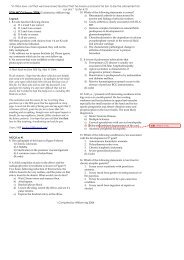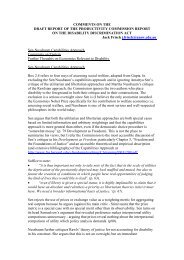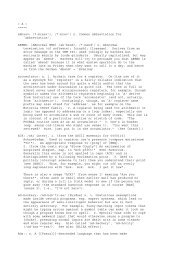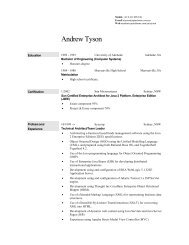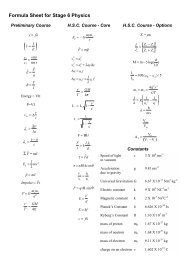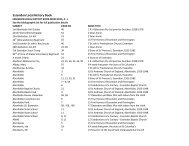Notes to Submission to the Productivity Commission Inquiry into the ...
Notes to Submission to the Productivity Commission Inquiry into the ...
Notes to Submission to the Productivity Commission Inquiry into the ...
You also want an ePaper? Increase the reach of your titles
YUMPU automatically turns print PDFs into web optimized ePapers that Google loves.
concerned. Thus, it could be argued that in general <strong>the</strong> impossibility of comparingidiosyncratic and unpredictable personal tastes across individuals makes anythingstronger than a Pare<strong>to</strong> criterion impractical - but <strong>the</strong> argument is not strong insofar as it iseasier <strong>to</strong> compare needs by objectively measurable impairments. Similarly, one couldargue that in relatively developed economies, subsistence is not an issue for most people,and <strong>the</strong>refore <strong>the</strong> distinction between primary and secondary needs/goods is notmeaningful - but <strong>the</strong> argument is not strong insofar as people with impairments need acritical minimum of primary goods in order <strong>to</strong> be able <strong>to</strong> function. Finally, it could beargued that consumption and production is separable for most people who have access <strong>to</strong>primary goods and for whom <strong>the</strong> social and built infrastructure is relatively seamless - but<strong>the</strong> argument is not strong insofar as people with impairments who are excluded fromschooling, travel, buildings and communication are concerned by an inaccessibleinfrastructure and poverty.Implications• Development involves expanding <strong>the</strong> freedoms enjoyed by individuals andremoving <strong>the</strong> sources of unfreedoms such as poverty and poor economicopportunity. Impairments may be seen as a source of unfreedoms due <strong>to</strong> itsrestrictive nature on individual functioning. If so, <strong>the</strong>n development in thiscontext involves alleviating or removing disability while promoting capabilities. 11• Recognition of impairment and <strong>the</strong> ensuing poverty implies that <strong>the</strong>re is a priorordering of wants as between primary wants <strong>to</strong> satisfy <strong>the</strong> ability <strong>to</strong> function andsecondary wants which satisfy tastes, and that increased well-being involvesallocating resources in such a way that some sort of priority is given <strong>to</strong> primarywants. The economic case for minimalist government assumes <strong>the</strong>se issues awayand is <strong>the</strong>refore not as general as is sometimes supposed.• The Rawlsian argument for greater income equality consistent with maximumpersonal liberties also has weaknesses when confronted with impairment. Itappears <strong>to</strong> account for impairment in its argument that society is better off onlywhen individuals with <strong>the</strong> lowest income are made better off, but its prescriptionsappear <strong>to</strong> go both <strong>to</strong>o far and not far enough. The Rawls logic ‘over-redistributes’insofar as it assumes that individuals behind <strong>the</strong> ‘veil of ignorance’ are highlyrisk. To <strong>the</strong> extent that <strong>the</strong>y might love risk, <strong>the</strong>y might not contract <strong>to</strong> redistributeincome <strong>to</strong> low-income individuals with impairments and in extreme cases mayseek <strong>to</strong> let <strong>the</strong>m die as is done in social contracts in some primitive pre-industrialeconomies. On <strong>the</strong> o<strong>the</strong>r hand, Rawls under-redistributes insofar as even forhighly risk averse individuals, income equality does not guarantee that individualswith impairments will have that threshold of primary goods that would enable<strong>the</strong>m <strong>to</strong> undertake <strong>the</strong> various functions necessary for well-being.• The Sen-Nussbaum capabilities approach:o provides an alternative criterion (ensuring satisfaction of primary needs) <strong>to</strong><strong>the</strong> Pare<strong>to</strong> criterion (ensuring a state where no individual’s position isimproved except at <strong>the</strong> expense of ano<strong>the</strong>r individual)11 Welch15



